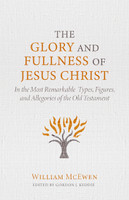
McEwen, William
The Glory and Fullness of Christ: In the Most Remarkable Types, Figures, and Allegories of the Old Testament (McEwen)
Description
William McEwen is one of the forgotten writers of the Scottish church of the eighteenth century and one of the great popular exponents of a sound biblical typology. In this book, McEwen investigates numerous people, places, and things in the Old Testament and shows how they prefigure the Lord Jesus Christ. Each chapter exhibits a lively meditation, providing concise, conversational, and user-friendly explanations of each subject under review. If you wish to better understand how the Hebrew Scriptures point to Jesus, read McEwen on the types and prepare to delight in the glory and fullness of Christ.
Table of Contents:
Foreword by Gordon J. Keddie
A Memoir by John Patison
Preface (1763) by John Patison
Book 1: Typical Persons
1. Christ and Adam compared
2. Noah
3. Melchizedek
4. Isaac
5. Jacob
6. Joseph
7. Moses
8. The Priesthood
9. Joshua
10. Samson
11. David
12. Solomon
13. Jonah
Book 2: Typical Things
1. Jacob’s Ladder
2. The Burning Bush
3. The Pillar of Cloud and Fire
4. The Manna in the Wilderness
5. The Rock in the Wilderness
6. The Brazen Serpent
7. Thoughts on the Veil of Moses
8. The Sacrifices
9. The Ordinance of the Passover
10. The Ordinance of the Scapegoat
11. The Ordinance of the Red Heifer
12. The Ordinance of the Year of Jubilee
13. The Law of the Leper
14. The Law of the Near Kinsman
15. The Holy Nation of Israel
16. The Victory over the Nations of Canaan
17. The Allegory of Hagar and Sarah
Book 3: Typical Places
1. The Cities of Refuge
2. The Tabernacle in the Wilderness
3. The Temple of Solomon
3.1 The Ordinance of the Ark and Mercy Seat
3.2 The Ordinance of the Golden Table
3.3 The Ordinance of the Golden Candlestick
3.4. The Ordinance of the Golden Altar
3.5. The Ordinance of the Brazen Altar
3.6. The Ordinance of the Brazen Laver
3.7. The Ordinance of the Anointing Oil
4. The Land of Canaan
5. The Holy City of Jerusalem, and the Holy Hill of Zion
5.1. The Feast of Tabernacles
5.2. The Fast of Anniversary Atonement
5.3. The Feast of First-fruits and of Pentecost
5.4. The Feast of the New Moon
5.5. The Metaphorical Priesthood of all Christians
An Evangelical History
The Great Matter and End of Gospel Preaching
Author
William McEwen (1735–1762) served as minister of the gospel at Associate Congregation in Dundee, Scotland. He studied divinity under Ebenezer Erskine and James Fisher, leaders in the Scottish secession from the national church.
Endorsements
“MacEwen of Dundee we name by himself. He was one of the brightest ornaments of the Secession movement. He died at the early age of twenty-eight. But he left a book that embalms his memory.... This work deals with the types of Scripture in a vein of fine Evangelical teaching, and it is expressed in what was regarded as the classical English of the middle of the eighteenth century.... And such a high and dry Anglican churchman as Dean Burgon makes the rather grudging admission that the best book he knew in English on the types was by a Scotsman and a Presbyterian.” — John Macleod, in Scottish Theology
“This long-overdue republication of the once-famous ‘McEwen on the types’ fills a massive lacuna in current devotional and exegetical literature. Steering a careful middle course between the ancient hermeneutical rocks of allegorization and the modern shoals of dry academic dissection, this pastor-teacher takes us by the hand on a devotional journey through the Old Testament to illustrate Christ’s words, “These are they which testify of Me” (John 5:39). Preachers of Old Testament sermons will be challenged whether their work is done when they’ve simply checked the correct redemptive-historical boxes, and Christ’s sheep will be delighted to recognize the familiar voice of their Shepherd in persons, places, and things they perhaps never expected. Readers will not have to be persuaded by every typological detail of McEwen’s truly profound and unique work to be deeply blessed by these soul-nourishing meditations.” — David G. Whitla, professor of church history, Reformed Presbyterian Theological Seminary; and coauthor of Portraits of Christ